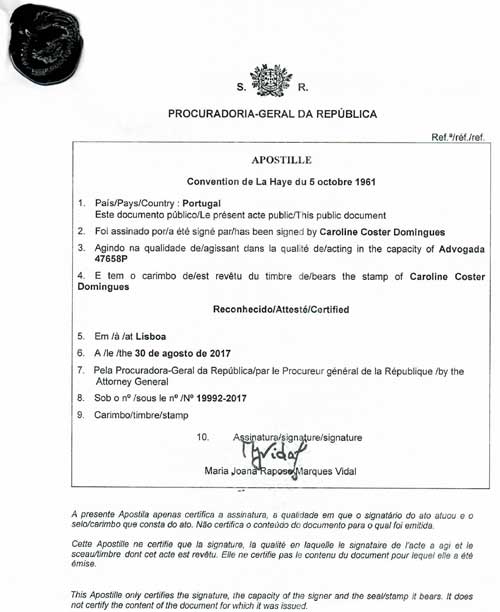
Schmidt & Schmidt covers the full spectrum of legalization services for documents issued in Portugal.
Portugal joined the Hague Convention on the Simplified Authentication of Documents on 6 December 1968; the Convention entered into force on 4 February 1969.
The apostille, or the “Hague apostille” is a certificate that authenticates the origin of a public document (e.g., a birth, marriage or death certificate, a judgment, an extract of a register or a notarial attestation). It confirms the authenticity of the signature and the authority of an official who signed the public document.
Documents issued in Portugal are certified with an apostille in accordance with the Hague Convention of 1961 are recognized in all Member States of the Hague Convention and do not require any other form of certification, such as consular legalization, which considerably reduces the costs and time required for the certification of documents. So far, more than 120 states have joined the Convention.
The apostille is not sufficient for use in the states that are not party to the Hague Convention. In this case, consular legalization applies to a public document.
.
Designated Competent Apostille Authorities in Portugal
In Portugal, the process of obtaining an apostille is facilitated by a range of Designated Competent Authorities that oversee different regions. Among these authorities is the Attorney General of the Republic, that takes a central role in the apostille issuance process.
The Attorneys General representing regions such as Porto, Coimbra, and Évora also contribute to the smooth operation of the apostille system. Furthermore, the Assistant Attorneys General work collaboratively with the Representatives of the Republic for the Autonomous Regions of Madeira and Açores. This collaborative approach ensures that documents originating from these autonomous regions are duly processed.
The fee for obtaining an apostille through these Designated Competent Authorities is set at €10.20. This cost is reflective of the administrative processes involved in verifying and endorsing the authenticity of documents, making them suitable for international use.
The apostille in Portugal is a square stamp in Portuguese with the obligatory heading "Apostille" and a reference to the 1961 Hague Convention in French (Convention de La Haye du 5 octobre 1961). The apostille certificate’s sides will be at least 9 centimeters long.
Types of documents

| Can be apostillized | Cannot be apostillized |
|---|---|
|
|
Specific aspects and document requirements for the apostille in Portugal
Portugal is among the 120 countries that recognize and issue apostilles in accordance with the Hague Convention of 5 October 1961. The apostille serves as a confirmation of the official status of a document.
It is essential to ensure the following criteria are met when preparing documents for the apostille process in Portugal:
- Confirm that the document in question is indeed classified as a public document.
- Validate that the document bears the certification of the appropriate competent public authority.
- Confirm whether the document has been certified by a lawyer or solicitor, aligning with the stipulations outlined in Article 5 and 6 of Decree-Law nº 237/2001 dated 30th August.
These measures help establish the authenticity and credibility of the certified document.
The apostille is issued in a uniform format. In Portugal, it has the form of a printed sticker with a handwritten signature of an official, an official seal, and a hologram.
In cases where apostilles are not recognized, holders of foreign documents will need to legalize them instead. However, If the country of destination of the document recognizes and issues apostilles, then legalization is unnecessary.
Legalization of Portuguese educational documents for use abroad
The procedure for legalizing educational documents from Portugal involves submitting the required documents to the designated authority along with the necessary fee. Once the apostille is affixed to your documents, it signifies their authenticity and is universally acknowledged. This holds significant value when presenting your educational records to foreign organizations, potential employers, or governmental bodies.
The application of an Apostille is also applicable to documents issued by Private Schools and Universities in Portugal, provided certain conditions are fulfilled:
- Documents issued by Private Schools need to undergo certification by the Department of Basic and Secondary Teaching located at Avenida 24 de Julho, 140, Lisbon, prior to their submission to the relevant authority responsible for issuing the Apostille.
- Documents issued by Private Universities require certification by the Superior Department of Teaching located at Avenida Duque de Ávila, 137, Lisbon, before being presented to the designated department for Apostille issuance.
Recognition of the authenticity of public documents within the EU
Documents from countries with which Portugal has bilateral agreements for exemption from legalization are not required to undergo any form of legalization procedures. Some of these include:
Contracting states of the Vienna CIEC Convention of 08.09.1976 (issuance of multilingual extracts from civil status registers: birth, marriage, and death certificate) are:
- Austria, Germany , Bosnia-Herzegovina, Bulgaria, Estonia, France, Italy, Cape Verde, Cyprus, Lithuania, Luxembourg, Macedonia, Moldova, Montenegro, Netherlands, Poland, Portugal, Romania, Switzerland, Serbia, Slovenia, Spain, Turkey.
Contracting states of the Munich CIEC Convention of 05.09.1980 (issuance of multilingual certificates of marriageability) are:
- Germany, Greece, Italy, Luxembourg, Moldova, Netherlands, Portugal, Switzerland, Spain, Turkey.
Regulation on public documents (EU) 2016/1191 of 6 July 2016
Furthermore, Regulation (EU) 2016/1191 of 6 July 2016 on public documents simplifies the circulation of certain public documents that must be presented in an EU Member State and have been issued in another EU Member State, thus exempting public documents from the confirmation of authenticity with the Apostille with the aim of reducing administrative burden and costs for citizens.
Consular legalization of Portuguese documents for use abroad
Consular legalization is the process of authenticating or certifying a legal document so a foreign country's legal system will recognize it as with full legal effect that is carried out by the diplomatic or consular mission of the country in which the document is to be used.
Consular legalization is more complex, time-consuming and costly than the simpler apostille procedure. Whereas apostille is usually issued within one step, consular legalization requires several pre-certifications before a public document can be certified at the embassy or consulate of the destination country.
It is a common requirement that the document has to be translated into the official language of the destination country before submission to the embassy. It is up to the diplomatic mission to decide about the authentication procedure.
The main differences between an apostille and consular legalization of documents
The common feature between apostille and consular legalization is that they authenticate an official document for presentation to institutions in another country. However, they have many differences.
| Apostille | Consular legalization | |
|---|---|---|
| Legal effect | Can be used in all countries that are party to the Hague Convention on the Simplified Legalization of Documents. | Use between States one or both of which is not a member of the Hague Convention, or where one of the contracting States has protested the accession of the other. |
| Difficulty | Moderate. To obtain an apostille, contact the competent apostille authority of the state of origin of the document. | High. For consular legalization, various inland authorities and a diplomatic mission of the state of destination must be involved. |
| Pre-certification | Usually not required. | Is obligatory. |
| Attestation at the state of destination embassy in the state of origin of the document | No need to contact the Consulate of the country of destination. | Is the final step of legalization. |
Apostille and consular legalization in all cities of Portugal
Schmidt & Schmidt provides apostille and consular legalization services for public documents originating from all regions across Portugal. We handle the entire process, from document review to obtaining the necessary certifications, ensuring that your documents are valid and recognized internationally. With our reliable services, you can confidently use your Portuguese public documents abroad.
Procurement of documents from Portugal
If the important documents are lost or damaged, or current copies of the documents are needed, the re-issue of the documents is required. It is not unusual for people outside Portugal to encounter difficulties with obtaining new documents when abroad. Our consultants will help you procure new documents from Portugal remotely, and we can arrange for your documents to be sent by courier anywhere in the world.
Certified translation of documents from Portugal
Copies and transcripts of civil status documents can be translated into any language by a sworn translator in Portugal or the translation can be done in the country of destination. We offer certified translations of civil status documents with further certification. The cost of the work is calculated according to the volume of the document in question.
Does the translation have to be apostillized?
Any foreign document issued in one country and used in another country must be legalized for use abroad. Therefore, the authenticity of a certified translation from Portugal needs to be certified by an apostille. Consequently, many authorities may not accept certified translations from Portugal if the translation has not been properly authenticated in Portugal for use abroad. To avoid this confusion, translations should better be made in the state of the destination of the document.













































